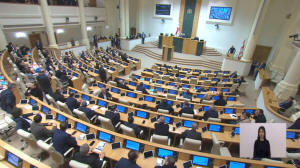Georgia's parliament drops 'foreign agents' bill
 Send a link to a friend
Send a link to a friend
 [March 10, 2023]
By Jake Cordell [March 10, 2023]
By Jake Cordell
TBILISI (Reuters) - Georgia's parliament on Friday dropped plans for a
"foreign agents" bill that had triggered a political crisis and
threatened to derail the country's bid for closer ties with Europe.
Lawmakers voted against the legislation in the second reading on Friday
after the ruling Georgian Dream party pulled its support for the bill.
Tens of thousands of Georgians had taken to the streets in the capital
Tbilisi for three consecutive nights of protest against the initiative,
saying the government was taking the country in an increasingly
authoritarian direction.
Police used tear gas, stun grenades and water cannon to disperse the
protesters, detaining dozens in the process.
The bill would have required non-government organisations (NGOs) that
receive more than 20% of their funding from abroad to register with
Georgia's Justice Ministry as a Foreign Agent.
Opponents said the bill was reminiscent of a 2012 Russian law that
Moscow has used extensively to crack down on civil society and
independent media. The plans bolstered domestic criticism of the
government as being too close to Moscow, in contrast to Georgian public
opinion, which is fiercely anti-Russian.

Critics say the "foreign agent" tag is designed to discredit independent
NGOs in the eyes of the public.
Human Rights Watch said the law would have had "a serious chilling
effect on groups and individuals working to protect human rights,
democracy, and the rule of law".
The government had defended the measures as necessary to increase
transparency in funding of NGOs and unmask critics of the powerful
Georgian Orthodox Church. It rejected comparisons with Russian
legislation.
RUSSIAN CONNECTION
In Friday's vote, 35 lawmakers voted against the plans, one was in
favour while a majority of the 112 parliamentarians present - including
all but one from the ruling party - abstained.
The bill had cleared its first reading earlier this week after lawmakers
brawled in the chamber during a debate on the initiative.
[to top of second column]
|

Lawmakers attend a plenary session of
parliament where they vote on controversial 'foreign agents' bill
that sparked mass protests in recent days, in Tbilisi, Georgia March
10, 2023, in this still image taken from video. Parliament of
Georgia/Handout via REUTERS

The proposals were widely criticised abroad, with European Union
officials calling it incompatible with Georgia's ambition to join
the bloc. Both the EU and the United States welcomed the decision to
drop the bill.
The Kremlin said it had no involvement in the Georgian bill and
rejected suggestions that it was Russian-inspired.
Kremlin spokesman Dmitry Peskov told reporters on Friday that Russia
was concerned about possible "provocations" in the Russian-backed
breakaway regions of Abkhazia and South Ossetia amid the unrest. He
also blamed the United States, without evidence, for whipping up
anti-Russia sentiment in Georgia.
Russia and Georgia fought a short war in 2008 over control of the
two regions - internationally recognised as part of Georgia but
controlled by Moscow-backed local authorities. Moscow and Tbilisi
have no formal diplomatic relations.
Georgian Dream lawmakers had said the bill was based on the United
States' own Foreign Agents Registration Act, which primarily covers
lobbyists working directly for foreign governments. Washington has
rejected the comparison.
Following Friday's vote, Georgian Dream chairman Irakli Kobakhidze
said the bill had at least raised awareness of the issues of foreign
funding of groups in Georgia, according to the iMedi news outlet.
He also said the proposals would "expose" those responsible for
"branding fair elections as fraudulent, for insulting the church and
(pushing) LGBT propaganda".
Georgian Dream said it would pull the bill unconditionally but
indicated in a statement it still favours plans to "ensure
transparency of foreign influence in our country" in the future.
(Reporting by Jake Cordell, Felix Light, David Chkhikvishvili and
Ben Tavener in Tbilisi; editing by Guy Faulconbridge, Gareth Jones
and Angus MacSwan)
[© 2023 Thomson Reuters. All rights
reserved.]This material may not be published,
broadcast, rewritten or redistributed.
Thompson Reuters is solely responsible for this content. |